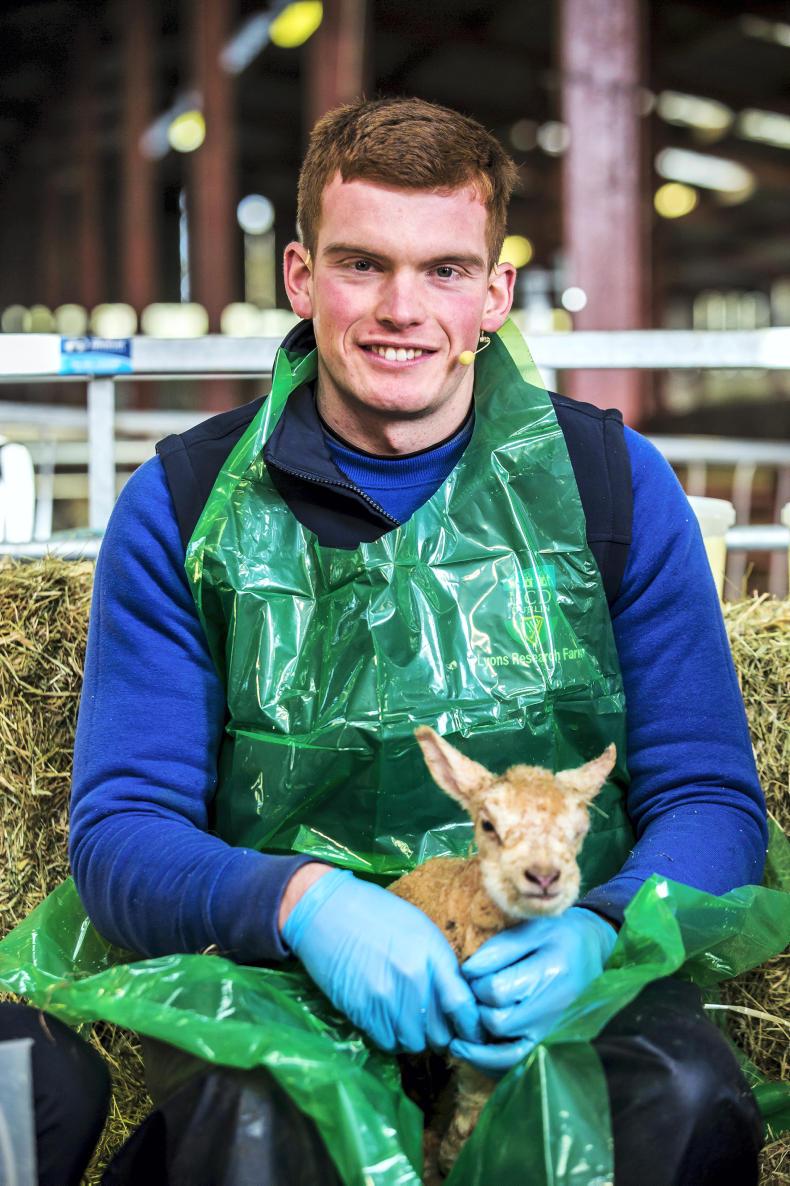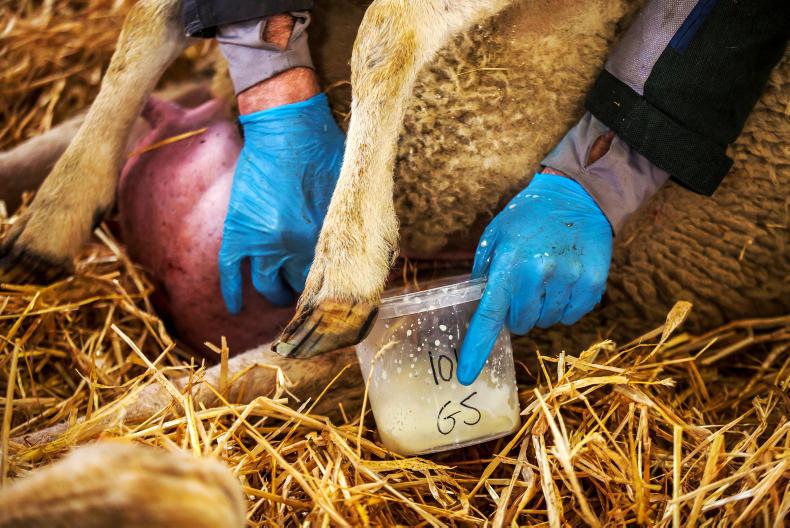UCD Lyons Farm has a long tradition of undertaking research on colostrum. The latest study is being carried out by PhD student Jonathan Higgins who is looking into the most appropriate late-pregnancy feeding programme to enhance colostrum quality and quantity along with ewe and lamb performance.
The study consists of a batch of 90 ewes being fed a late-pregnancy diet containing grass or wholecrop silage along with concentrate supplementation. Feeds are weighed in and out to monitor intake and ewe efficiency with detailed records continuing through to lambs being weaned.
With regards testing colostrum quality, once a ewe lambs an apron is placed around her udder to prevent lambs from suckling.

PhD student Jonathan Higgins. \ Philip Doyle
The ewe is then milked one hour, 10 hours and 18 hours post-lambing. The yield of colostrum and antibody level is measured and lambs receive colostrum via stomach tubing. The level of antibodies received via passive transfer through colostrum is also measured 24 hours post lambing.
Feeding critical to quantity and quality
Tommy Boland, associate professor with the UCD School of Agriculture and Food Science highlights the important role late pregnancy feeding programmes play in ensuring ewes lamb down with a good yield of high-quality colostrum. Late-pregnancy feeding not only has an effect on colostrum, it also has an effect on milk yield.

Lambs born to ewes included in the study are stomach tubed while colostrum is being milked.\ Philip Doyle
Tommy stresses the importance of feeding high-quality ingredients and increasing the protein content of the diet in the final weeks of gestation and early lactation. The pressure on ewes is put in context by the comparison that a ewe rearing two lambs growing at 300g daily is producing to the same equivalence of a dairy cow producing 30l of milk daily.
Read more
Putting the science of colostrum into practice
Watch: Lambing Live - what's the future for lamb and sheepmeat?
Watch: Lambing Live - challenges and opportunities for the industry
Watch: Lambing Live - tackling flock health
UCD Lyons Farm has a long tradition of undertaking research on colostrum. The latest study is being carried out by PhD student Jonathan Higgins who is looking into the most appropriate late-pregnancy feeding programme to enhance colostrum quality and quantity along with ewe and lamb performance.
The study consists of a batch of 90 ewes being fed a late-pregnancy diet containing grass or wholecrop silage along with concentrate supplementation. Feeds are weighed in and out to monitor intake and ewe efficiency with detailed records continuing through to lambs being weaned.
With regards testing colostrum quality, once a ewe lambs an apron is placed around her udder to prevent lambs from suckling.

PhD student Jonathan Higgins. \ Philip Doyle
The ewe is then milked one hour, 10 hours and 18 hours post-lambing. The yield of colostrum and antibody level is measured and lambs receive colostrum via stomach tubing. The level of antibodies received via passive transfer through colostrum is also measured 24 hours post lambing.
Feeding critical to quantity and quality
Tommy Boland, associate professor with the UCD School of Agriculture and Food Science highlights the important role late pregnancy feeding programmes play in ensuring ewes lamb down with a good yield of high-quality colostrum. Late-pregnancy feeding not only has an effect on colostrum, it also has an effect on milk yield.

Lambs born to ewes included in the study are stomach tubed while colostrum is being milked.\ Philip Doyle
Tommy stresses the importance of feeding high-quality ingredients and increasing the protein content of the diet in the final weeks of gestation and early lactation. The pressure on ewes is put in context by the comparison that a ewe rearing two lambs growing at 300g daily is producing to the same equivalence of a dairy cow producing 30l of milk daily.
Read more
Putting the science of colostrum into practice
Watch: Lambing Live - what's the future for lamb and sheepmeat?
Watch: Lambing Live - challenges and opportunities for the industry
Watch: Lambing Live - tackling flock health








 This is a subscriber-only article
This is a subscriber-only article









SHARING OPTIONS: